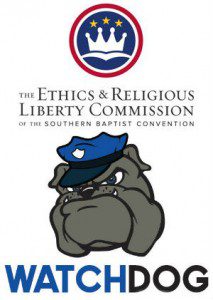Hemant Mehta draws our attention to a recent post by Samuel James, a communications specialist for the Southern Baptist Ethics and Religious Liberty Commission. James offers 10 suggestions — wait, no, the ERLC doesn’t do suggestions — 10 Commandments for “What Not to Do When a Fellow Christian Embarrasses the Rest of Us.”
A more accurate title might have been something like “10 Reasons You Little People Must Never Attempt to Question Your Betters.” Or, maybe, “10 Sanctimonious Pieties to Ensure the Preservation of Any Unjust Status Quo.”
But it’s actually even worse than that.
Most of James’ piece is clumsy in its transparently Orwellian service to The Powers That Be, but he does make one semi-slick maneuver at the outset, muddying the waters by framing the topic as “embarrassment.” James suggests this covers every context in which public criticism might be directed at a Christian public figure or the church as a whole. He describes it like this:
People who take the name of Christ and identify with His church are going to say or do something so inexplicable, so ridiculous, and so embarrassing that the rest of us will either shake our heads in disbelief or groan in frustration. Sometimes it’s something silly. Sometimes it’s more serious, and even blasphemous.
Yes, sometimes Christians in the public eye do “something silly” and groanworthy. But that’s not really what James is talking about with his 10 Commandments — all of which have to do with the kind of responses we might have to something “more serious” — something much more serious. James warns us not to “legitimize or rationalize bitterness and suspicion towards the church” and not to “start a ‘watchdog blog.'” None of that is at all relevant to the matter of simple “embarrassment” over “something silly.” Nobody has ever started a watchdog blog in response to goofy misstatements or merely awkward public missteps. (That’s why “BidenWatch” isn’t a thing.)

What James is talking about is not embarrassment, but scandal. He’s talking about how we should respond when Christian leaders and public figures use their platform, their power, and their influence to do harm and to promote injustice. He’s talking about accountability for Christian leaders who abuse power and hurt people.
And Samuel James is against that. He wants his leaders wholly unaccountable, thankyouverymuch.
This isn’t surprising, given that James works for the Southern Baptist ERLC. That outfit used to be run by Richard Land until he got chased out of town due to being a scandalous bigot and a serial plagiarist. James’ list of 10 commandments reads like a description of how Land was eventually held accountable for his disgraceful words and actions.
One way to avoid a repetition of such a scandal would be to ensure that Southern Baptist leaders, going forward, try not to spout racist garbage on the radio and not to plagiarize. But that’s not Samuel James’ preferred approach to avoiding scandal. He’d rather just suppress all dissent and smother public accountability under a fluffy pillow of pious whitewash.
(James even — indirectly — invokes the Matthew 18 Police, when he speaks of “Gospel reconciliation.” Matthew 18 is not the last refuge of pious scoundrels — it’s the first and only refuge of pious scoundrels.)
The meat of James’ post is commandments 6-9 — which read like they were written by someone who flunked out of the Olivia Pope School of Scandal Management:
6) Don’t ever, ever, ever, EVER even passively, suggestively, or indirectly legitimize or rationalize bitterness and suspicion towards the church. If someone says to you, “This is why I don’t go to church,” they might think they’re telling the truth, but they’re not. They don’t love the church because they don’t love Jesus. Saying, “Yes, you have a point, church can be so frustrating” feels like empathy, but it’s not. It’s self-preserveration [sic] at the cost of slandering Christ’s body.
7) Don’t start a “watchdog blog.” Seriously, don’t ever.
8) Don’t read the comments.
9) Don’t leave a comment.
I suppose it’s refreshing, in a way, that James is so enthusiastically candid about silencing and tone-policing.
But let’s acknowledge the elephant in the room here — or, more specifically, the child-molesting-clergy-being-protected-by-the-hierarchy-because-reputation-is-more-important-than-people-or-justice in the room here. That context — the decades long scandal of horrific predatory abuse by clergy and the complicity of church leaders in covering it up — is the sort of “silly embarrassment” that demonstrates just how toxic and awful James’ 10 commandments are.
James’ sixth commandment might merely seem vaguely dickish until you read it with that sort of context in mind. Then you realize it’s far, far worse.
Tell me, Samuel James, what should I do when I meet someone who was preyed on as a child by a pastor, and has since seen that pastor defended and promoted by the church?
Don’t ever, ever, ever, EVER even passively, suggestively, or indirectly legitimize or rationalize bitterness and suspicion towards the church. If someone says to you, “This is why I don’t go to church,” they might think they’re telling the truth, but they’re not. They don’t love the church because they don’t love Jesus. Saying, “Yes, you have a point, church can be so frustrating” feels like empathy, but it’s not. It’s self-preserveration [sic] at the cost of slandering Christ’s body.
I don’t think “evil” is too strong a word for that response. I mean, whether it’s due to actual malice or just to a staggering ignorance, the result is malicious and harmful. It’s horrible pastorally. It is, in every way, the opposite of prophetic.
Samuel James: “You will find out on that day when you go in to hide in an inner chamber.” (No one really knows what that means, exactly, since the editors of 1 Kings failed to include the ending to that story. But it’s certainly appropriate here.)












